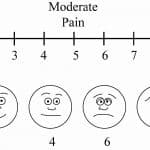Table of Contents
What is neuralgia?

Neuralgia or nerve pain is a sharp, shocking pain which affects the nerve that carry sensation to the brain. Any kind of irritation or damage to the nerve causes neuralgia. The nerve may be anywhere in the body.
Neuralgia or nerve pain can affect any body part, causing mild to severe pain. Certain medications and surgical procedures can effectively treat neuralgia.
How bad is my neuralgia?
Your clinic will use this scale (see figure on right) to measure how bad your pain is.
Mild: Pain score of 3 or less on the VAS scale. This pain should not stop you from doing activities of daily life (like grocery shopping, laundry, cooking). Other symptoms are tingling, numbness and spontaneous pain. Most of the time, mild nausea can be safely managed at home by following the tips given below.

Moderate: Pain score of 4 to 6. This pain stops you from doing instrumental activities of daily life (preparing meals, managing money, shopping, doing housework, and using a telephone). Other symptoms include shooting, burning, or stabbing pain.
Severe: Pain score of 7 or higher. This pain is bad enough to stop you from even the most basic (self-care) activities of daily life like eating, dressing, getting into or out of a bed or chair, taking a bath or shower, and using the toilet. Seek medical help under your doctor’s supervision if you have difficulty in sleeping or resting, anxiety, depression and sharp or sudden pain as an electric shock.
How to manage mild neuralgia?
Keep track of your pain levels using Ankr (myAnkr web portal or the Ankr app). It will help you describe the pain to your doctor or nurse.
- Supplements and vitamins. In some cases, nerve pain can be worsened or even caused by a deficiency of vitamin B12.
- Anticonvulsant medications – to treat the pain and muscle spasms associated with trigeminal neuralgia
- Antidepressants – to help relieve pain in some cases
- Physical therapy (physiotherapy and osteopathy)
- Alternative therapies (acupuncture, hypnosis and meditation).
- Topical creams with capsaicin.
- Assistive devices (canes or splints) can make it easier to move around and reduce pain.
- Look into stress management techniques. Try other approaches (yoga, meditation, or deep breathing) that will help you relax.
How to manage severe neuralgia?
Contact your health care provider if you:
- Develop shingles
- Have symptoms of neuralgia, if over-the-counter pain medicines do not relieve your pain
- Have severe pain (consult a pain specialist)
What causes neuralgia?
- Chemical irritation
- Chronic kidney disease
- Diabetes
- Infections, (herpes zoster / shingles), HIV/AIDS, Lyme disease, and syphilis)
- Chemo medicines (cisplatin, Paclitaxel, or vincristine)
- Porphyria (blood disorder)
- Pressure on nerves by nearby bones, ligaments, blood vessels, or tumors
- Trauma (including surgery)
